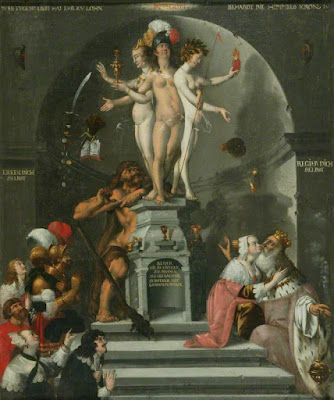Those who work for "the common good"
In recent decades, public service careers have suffered a loss of status. Where the Victorians built grand hospitals, town halls, law courts and schools for their public servants, our estimation of the prestige of these jobs can be inferred from our decaying parliament building, structurally endangered schools and shabby hospitals. It is no accident that the grandest buildings we moderns will leave to future generations are the glittering central London phalluses that house investment banks and City law firms...
The current crisis in teacher recruitment and retention can be traced not only to the profession's declining real-term's pay but also to its declining social prestige. It was once a guarantee of middle-class status but the teachers I know in London live in cramped flat-shares well into their thirties - a way of life recognisable to the capital's underpaid Uber drivers and baristas...
Meanwhile the prestige of professions like banking and commercial law has dramatically increased. In a competitive meritocracy we have absorbed the idea that professional success is almost a virtue in itself. The "greed is good" ethic of the 1980s allowed bankers and hedge-fund managers to imagine that their pursuit of career advancement would both make them richer and contribute (however indirectly) to the broader public good...
 |
| Allegory of Virtue Albert Freyse (d. 1652) Photo Credit: Manchester Art Gallery [CC BY-NC-ND] |
The accountant who rolls his eyes at teacher's long school holidays is measuring virtue in brute office hours, not social usefulness...
Banks and other large corporations have become increasingly shameless in performing their virtue by advertising their agreement with fashionable progressive causes. Thus an employee of a bank which celebrates Pride month or stages mental health awareness days can allow himself to dimly imagine that he is involved in a virtuous enterprise in a way that would have seemed preposterous to previous generations. One of the more sinister aims of "woke capitalism" is to blur the moral line between the selfless doctor and the self-interested investment banker.
The future of our politics and of professions such as teaching requires that we rediscover the glamour of genuine public service. Stewart's* instinct is right: a career in a hospital or a difficult state school or in parliament is not merely worthy but positively heroic, in a way a life spent at an investment bank can never be.
*Rory Stewart was a former Conservative minister
(James Marriott, The Times, 2023)
Those who work for "The Common Good" deserve to be recognised and given greater respect and financial remuneration. That was why, when the nurses in the UK were recognised as "heroes" during the pandemic and then treated extremely shabbily in their quest for greater pay, the public supported them in their fight with the government.
There needs to be an extensive re-examination of what a person's worth should be both in our present and future society. That should also apply to the so called 'private sector' including bankers, lawyers, heads of public utilities etc. Perhaps Michael Mandel could chair the global debate!
Comments
Post a Comment